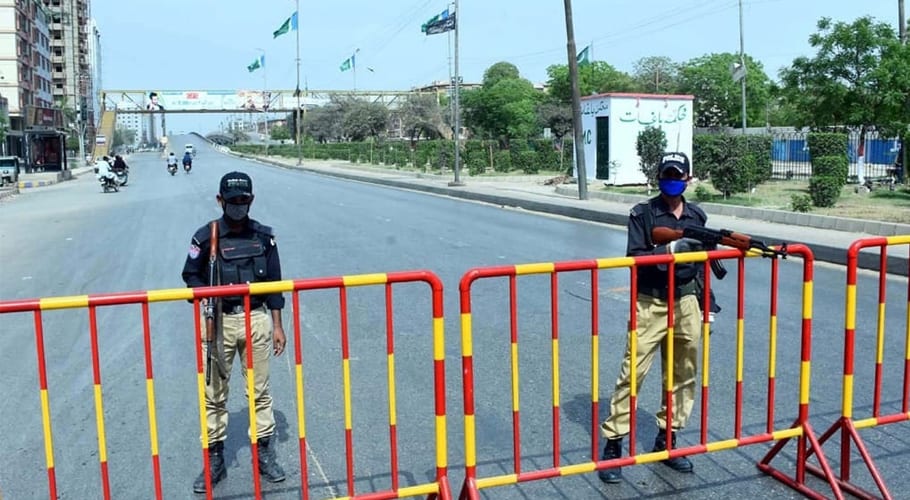The resurgence of coronavirus cases across the country and the subsequent decision by the authorities to impose restrictions in major cities has highlighted once again how critical an efficient and collective strategy is to trounce the pandemic.
There has been a constant increase in positivity percentage and prevalence of Covid-19 in Punjab, Khyber Pakhtunkhwa and Sindh during the last two weeks which poses an imminent threat to public health.
NCOC expresses concern
The National Command and Operations Centre (NCOC) has expressed concern over the rising number of COVID-19 cases and asked the provincial authorities to strictly implement restrictions in order to limit the virus spread.
Meanwhile, smart lockdowns in different cities of the provinces are also being considered while a further ban on international travel from some countries will be considered after consultation with the relevant authorities.
New standard operating procedures (SOPs) have been issued to administrations across the country to ensure that precautionary steps are followed.
Smart lockdown imposed in Sindh
The Sindh government today imposed a smart lockdown across the province till April 15 in order to contain the spread of COVID-19.
According to a notification, there will be a smart lockdown as per earlier decision based on disease hotspot as deemed appropriate by commissioners and deputy commissioners under Sindh Epidemic Diseases Act 2014.
Timings of all commercial business such as markets, shopping malls, marriage halls, would be from 6 am to 10 pm except essential services medical stores including medical stores, clinics, as well as petrol pumps, bakeries and milk shops.
The provincial government has also imposed a ban on indoor dining at restaurants and only outdoor dining and takeaway would be allowed. All amusement parks would be closed by 6 pm whereas all indoor facilities such as gyms cinemas, theatres and shrines would also be closed.
No indoor weddings would be allowed. Only outdoor gatherings /weddings would be allowed only with a maximum limit of 300 individuals with defined SOPs.
Work from the home policy would be implemented whereas 50 percent of staff in attendance would be allowed in all public and private offices.
Punjab govt imposed new restrictions
On Sunday, a smart lockdown had been imposed in various cities of Punjab, including 16 areas of Lahore, 17 in Gujarat, three sectors in the federal capital and four areas of Rawalpindi.
According to the provincial authorities, all business centers in Punjab will be closed from Monday at 6 pm, whereas markets will be closed on Saturday and Sunday.
Whereas, shops selling fruits, vegetables, milk, meat, and items of necessity as well as bakeries will remain open till 7:00 pm.
Moreover, only one person will be allowed to leave the house in case of an emergency. In addition, 50% of staff attendance at private and government offices will be permitted.
All indoor wedding halls, shrines, cinemas, and community centers have been closed in the most affected areas of Gujarat, Lahore, Rawalpindi, Sargodha, Faisalabad, Multan, and Gujranwala.
Micro lockdown in Peshawar
The provincial authorities have imposed a smart lockdown in five areas in Peshawar after the surge in Coviod-19 positivity rate as health officials are set to seek permission for the imposition of standard operating procedure in three more districts of Khyber Pakhtunkhwa.
Peshawar Deputy Commissioner in a notification said that on the recommendation of district health officers, the smart lockdown was imposed in Street 9, Sector E II, Street 5, Sector F-V, Phase IV, Street 3, Gulbahar No.4 and Street 11, Defence Colony.
He said that the entry and exit points of the areas would remain restricted and only those people, who were supplying essential commodities, medicines, food, water to the residents, would be allowed.
Vaccination campaign
PM Imran had inaugurated the first phase of the coronavirus vaccination campaign for frontline health care workers on February 02 when Dr Rana Imran was given a jab with Chinese fi rm Sinopharm’s vaccine after receiving 500,000 Sinopharm doses from China.
Special Assistant to the Prime Minister (SAPM) on Health Dr Faisal Sultan had earlier said that more than 52,000 frontline healthcare workers had been vaccinated till now. The healthcare workers getting vaccinated showed how much they trust the vaccine’s efficacy, he added.
On March 10, Pakistan had kicked off the second phase of the coronavirus vaccination drive with the hopes of ensuring that people over the age of 60 are vaccinated.
The latest COVID-19 situation
Pakistan has recorded 2,253 new coronavirus cases and 29 more deaths in the past 24 hours as the situation worsens across the country.
According to the latest figures from National Command and Operation Centre (NCOC), the total number of cases reported in the country has reached 607,453 with the inclusion of fresh cases. The death toll from the disease has reached 13,537.
The total count of active cases is 22,038 and the positivity rate increases up to 5.11 percent while 1,823 are still in critical condition.
In the past 24 hours, as many as 1,307 patients have recovered from the virus. A total of 44,061 tests were conducted across the country during this period. Overall 571,878 people have recovered from the deadly disease so far while 9,529,763 samples have been tested so far.
Need an efficient and collective strategy
The pandemic has also played the role of a double-edged knife i.e. if the lockdown is not imposed, the fear of an increase in the number of coronavirus cases rises, whereas if the lockdown is strictly imposed then economies tend to bear the repercussions.
Therefore we need a strategy that, at the same time, restrains the infection and also permits some basic level of economic activity.
Earlier in Pakistan COVID-19 cases were successfully lowered after restrictions and SOPs were enforced; now it is time to understand the situation people should take steps to limit the spread of the virus.



































